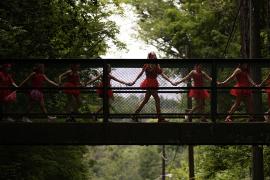Camp–parent partnerships reach beyond customer satisfaction; they are at the core of parent–camp loyalty. In most Hispanic communities, the camp-parent partnership becomes a critical alliance that often originates at the camp and is based on the mutual fulfillment of needs. This is especially true for nonprofit camps serving underprivileged minority clienteles where partnerships are crucial for the mere existence of the camp.
In our quest for customer satisfaction, we fulfill campers' needs by providing a fun, secure, and nurturing environment. We also fulfill parents' needs by reassuring them about safety concerns, providing growth opportunities and skills development for their children, and making sure that our parents know that we are constantly making efforts to understand their culture and adjusting our approaches and philosophy to meet their needs. Parents and campers fulfill our camps' needs by providing important feedback, return business, word-of-mouth advertising, and by providing the camp with a prominent position in their communities which can translate into greater funding potential for us.
Loyalty is more. It is the direct result of strong relationships that go beyond partnerships — and although it is mutual, it usually originates with the camper and subsequently includes the parent. Loyalty is the parent's conviction that our camp has made the commitment to go the step beyond fulfilling needs to embrace his or her child and the family's culture as part of our camp's community. More often than not, the camp director is at the forefront of this delicate and important task. He or she acts as moderator between campers, parents, higher echelons of the organization, and finally the board of trustees.
An Eighty-Year History
The Union League Boys and Girls Clubs (ULBGC) Camp is a nonprofit agency camp. Located in southeastern Wisconsin, it serves campers from three different ethnic neighborhoods in Chicago: Pilsen, West Town, and Humboldt Park. For over eighty years, the camp, which is owned and operated by the Union League Boys and Girls Clubs, has been providing services to underprivileged children. As a beacon of outdoor programs in our communities, the camp has created many important partnerships — especially with the parents in the communities that it serves.
Of the 512 campers that attend camp each summer, about 97 percent are children who belong to ethnic minorities (63 percent Hispanic and around 34 percent African American). The priorities, in the past, for these populations have not included sending their kids to camp during the summer. However, the camp's success in forming strong partnerships has helped parents in these communities re-examine their priorities — now they are putting summer camp as a top item on their list of summer activities. Without a doubt this is the result of an overall camp strategy that has involved the untiring efforts of a committed board of trustees (through an active camp committee and various subcommittees), a visionary executive director, and the tireless work of a team of summer camp staff that strongly believe in the importance of the camp experience, the value of loyalty, and the significance of strong community partnerships.
A Worthy Challenge
Creating strong camp–parent partnerships in our communities has not been an easy task. It requires a constant exchange of information that moves upward from the campers to the board and downward from the board to the campers. While passing through the different points in between, (camp director, executive director, and different subcommittees) the information is received, interpreted, discussed, and shaped into the strategies that have helped create not only great camp-parent partnerships but also legendary loyalty that has campers and former campers coming back to camp year after year.
Communication
In 1995, we asked parents to share one of their greatest concerns about sending their children to camp. Their reply was that they could not communicate with their children while at camp. Because our boys and girls clubs operate in heavily Hispanic populated neighborhoods, we understood that concern and created a policy to address it. Even though we rarely allow campers to call home, we allow parents to call their children during mealtime. It is a welcomed courtesy that parents of first-time campers appreciate and use extensively.
The most interesting outcome of this unique communication policy is that by the second season, parents call fewer times than the first and by the third they stop calling entirely. As the first strategy that demonstrated the camp's commitment to serve parents and campers beyond customer service and satisfaction, it has helped cement a sense of trust for the next eleven years that has translated into more Hispanic parents sending their children to camp.
Visits
The next time we asked for feedback from parents, their concerns focused in one of our original policies that restricted parents from visiting their children at camp. Our challenge was to convince parents from inner-city Chicago — mainly first generation Hispanics — that the camp was a fun, safe, and positive place for their children. We realized that by not allowing them to visit the camp, the level of trust was not there. If they were not allowed to visit their children at camp, they were not going to send them.
In a drastic change of policy in 1996, we decided to implement an open-door policy for all parents who wished to visit their children at camp. With the implementation of this policy, we have seen an increase in satisfied parents who feel part of our camp community and in control of what's going on in the lives of their children.
Every weekend at the middle of each session, parents are welcomed to visit their children at camp. Many of them take their kids out of campgrounds for the afternoon and when they bring them back, campers seem to be more relaxed and ready for the following week. Parents leave camp convinced that everything is OK.
Each Sunday afternoon in the middle of the session, we have a giant cookout. Many parents drive more than sixty miles to come to camp to help at the grills and to serve the food. It becomes a family event, a community event. The open-door policy also provides parents the opportunity to bring clean clothes for their children, bring boxes full of goodies, and most importantly, meet personally with the cabin counselors, the unit leaders, and the camp director. It is partnership building at its best.
When some parents indicate that they cannot make the decision to send their children to summer camp because they have not seen the camp, the camp and the clubs make it possible for the parents who lack transportation to visit the camp. In some limited instances, when mothers show concern about their children attending summer camp, we provide transportation and invite them to visit the camp with their children. The Boys and Girls Clubs have gone as far as taking groups of parents during the months preceding the summer camp season to visit the camp and have offered summer camp programs like campfires, songfests, etc., at the clubs during the off season to familiarize parents and club members with the camp and all it offers. These efforts have had a tremendous effect in the way parents in our communities view our program and have strengthened the relationships between parents and staff.
Parent Volunteers
Some parents, although they recognized the value of the camp experience for their children, had never been away from their children for such an extended period of time. They asked if they could work as a volunteer at the camp when their child was there. Again, we were confronted with a situation that needed special attention. How many parents should we allow to volunteer? What should be the extent of their involvement?
Increased Community Outreach
As more parents discover the positive impact of the camp experience, we realize an increase in both public education and public relations on the benefits of summer camp. For example, for the last two years the Department of Multilingual and Multicultural Programs of the Chicago Public Schools has invited the Union League Boys and Girls Clubs Camp to make presentations about our summer camp programs to more than two hundred parents representing all the Chicago Public Schools. This is a definite product of the partnerships that the camp has created over the years with satisfied and loyal parents. Additionally, for five years, the ULBGC Camp in partnership with ACA, Illinois has held camp informational fairs in five Chicago Public Schools during report-card-pick-up day. This year, we increased the number to ten grammar schools.
As we move forward in our quest to serve the disadvantaged children living in our Hispanic and African American communities, it is clear that we will experience more parent concerns. We are already preparing for these concerns. For example, in November 2005, our Camp Program Subcommittee invited a group of campers of different ages and genders — and from different neighborhoods — to come to meet with our board and evaluate the last summer's program together. The outcome was outstanding. Not only did the campers feel that they had a say in the development of the program, but parents thought that inviting their children to be part of the process was an important step. Additionally, the subcommittee had the opportunity to make sound recommendations that will impact the delivery of camp programs for years to come.
The next step is to hold parent forums designed to encourage direct response and to learn more about their concerns, ideas, and expectations. We are continuously looking for new strategies that will increase our parents' sense of comfort with our approaches. Our camp team is committed to developing partnerships with other organizations that offer outstanding programs designed to improve the quality of life in underprivileged communities. We have partnered with FirstPic Inc., the Office of Justice Programs, and Immersion Presents to implement a crime prevention program while teaching campers about science and technology.
Our camp brochures are bilingual — written in both English and Spanish — and some summer staff are recruited from the same neighborhoods from which our clientele come. Parents are offered the opportunity to volunteer and visit the camp and are constantly reminded of the importance of camp–parent partnerships. The camp director makes sure that the camp maintains a strong presence in the schools where most of our campers attend.
The Future Looks Bright
The future looks bright for the Union League Boys and Girls Clubs Camp, yet we remain vigilant to the many challenges that might arise in our pursuit for excellent service. Our commitment is to serve our campers beyond just customer satisfaction and to create strong partnerships with their parents and the communities in which they live. Olga Gonzalez-Granat, an educator at the Valparaiso, Indiana, school district summarized our core camp philosophy — one that we've been practicing for years: "The Golden Rule is out. No longer are you expected to treat people the way you wish to be treated. The new rule is: Treat people as they wish to be treated."
David Lira Leveron has been a youth professional for the last twenty years. For the last thirteen years he has been the camp director at the Union League Boys and Girls Clubs Camp where he has succeeded considerably in increasing the number of Latino children attending summer camp. Currently, he serves on the Board of Directors for ACA, Illinois and co-chairs the Public Awareness Committee.
Originally published in the 2006 July/August issue of Camping Magazine.




